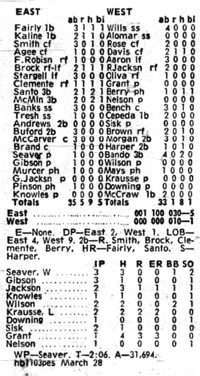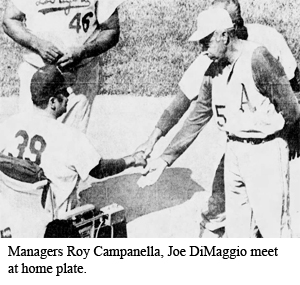In a fundraising game to honor the memory of slain civil rights activist Dr. Martin Luther King Jr., two of the top performers on a genuine field of dreams were Cardinals Lou Brock and Bob Gibson.
 On March 28, 1970, the East-West Major League Baseball Classic was played at Dodger Stadium in Los Angeles. According to the National Baseball Hall of Fame, the Saturday afternoon exhibition netted more than $30,000 for two beneficiaries:
On March 28, 1970, the East-West Major League Baseball Classic was played at Dodger Stadium in Los Angeles. According to the National Baseball Hall of Fame, the Saturday afternoon exhibition netted more than $30,000 for two beneficiaries:
_ Southern Christian Leadership Conference, a regional organization founded by King and others in 1957 to help coordinate grassroots efforts in civil rights and voting rights activities.
_ Martin Luther King Jr. Center for Nonviolent Social Change, also known as King Center. Located in Atlanta, the center was founded in 1968 by Coretta Scott King to preserve and advance her husband’s legacy. It houses a library, archives and exhibits. It’s also the burial site of Dr. King and his wife.
Most of baseball’s top players participated in the game, taking time out from spring training to show their support for King and his mission.
Baseball tribute
After King was assassinated on April 4, 1968 (the convicted murderer, James Earl Ray, was born in Alton, Illinois, 20 miles north of St. Louis), Bob Gibson spoke with emotion about the bitterness and frustration he felt. In his autobiography, “Stranger to the Game,” Gibson said, “I reeled from the impact of the assassination _ the cold-blooded murder of the one man in my lifetime who had been able to capture the public’s attention about racial injustice, break through some of the age-old social barriers and raise the spirits and hopes of black people across the country.”
According to the Baseball Hall of Fame, shortly after King was killed, ballplayers asked King’s associates what they could do as a public tribute to him, Joseph Peters, sports project director for the Southern Christian Leadership Conference, explained in a November 1968 letter to baseball commissioner William Eckert.
When Southern Christian Leadership Conference members suggested a fundraising game, Major League Baseball officials agreed to cooperate. The game initially was planned for March 1969, but the Southern Christian Leadership Conference asked for more time. That’s why the event was held in March 1970.
Though spring training exhibitions were under way, every big-league team made players available for the fundraising game and paid their expenses, the Associated Press reported.
Among those who came to Los Angeles to play were Hank Aaron, Ernie Banks, Johnny Bench, Lou Brock, Orlando Cepeda, Roberto Clemente, Bob Gibson, Reggie Jackson, Al Kaline, Willie Mays, Joe Morgan, Tony Oliva, Frank Robinson, Pete Rose, Ron Santo, Tom Seaver and Willie Stargell.
Mays traveled from Japan, where his club, the Giants, were playing goodwill games. In explaining why he made the long trip to Los Angeles, Mays told the Torrance Daily Breeze, “This cause is too important to pass up. At last, baseball players can show their feelings about the late Dr. King and his work through the medium of this game. I wouldn’t miss it.”
 Players from the East divisions of the American and National leagues were placed on an East team. The West team had players from the West divisions of both leagues. That gave fans the chance to see Angels and Dodgers, Mets and Yankees, and Athletics and Giants perform as teammates.
Players from the East divisions of the American and National leagues were placed on an East team. The West team had players from the West divisions of both leagues. That gave fans the chance to see Angels and Dodgers, Mets and Yankees, and Athletics and Giants perform as teammates.
Joe DiMaggio was chosen to manage the East team. His coaching staff: Billy Martin, John McNamara, Stan Musial and Satchel Paige.
The West team manager was Roy Campanella. His coaching staff: Don Drysdale, Elston Howard, Sandy Koufax and Don Newcombe.
Entertainer Bill Cosby held a reception for the teams at the Warner Brothers Studio the night before the game, the Los Angeles Times reported.
Star power
Starting lineups were selected by members of the Los Angeles-Anaheim chapter of the Baseball Writers Association of America and the Southern California Sportscasters Association.
The East batting order: 1. Ron Fairly, first base; 2. Reggie Smith, center field; 3. Frank Robinson, right field; 4. Willie Stargell, left field; 5. Ron Santo, third base; 6. Ernie Banks, shortstop; 7. Don Buford, second base; 8. Tim McCarver, catcher; 9. Tom Seaver, pitcher.
Banks, 39, a Cubs first baseman, was at shortstop for the first time in nine years.
East bench warmers included Lou Brock, Roberto Clemente and Al Kaline.
The West batting order: 1. Maury Wills, shortstop; 2. Pete Rose, center field; 3. Hank Aaron, left field; 4. Reggie Jackson, right field; 5. Johnny Bench, catcher; 6. Orlando Cepeda, first base; 7. Joe Morgan, second base; 8. Sal Bando, third base; 9. Don Wilson, pitcher.
Willie Mays and Tony Oliva couldn’t crack the starting lineup.
Ticket prices ranged from $10 to $2. Among the 31,694 spectators for the 2 o’clock game were baseball pioneers Jackie Robinson and Larry Doby, baseball commissioner Bowie Kuhn (successor to William Eckert) and entertainers Sammy Davis Jr. and Danny Kaye.
Mudcat Grant sang the national anthem, a recording of Dr. King’s “I Have A Dream” speech was played on the public address system, and Coretta Scott King threw the ceremonial first pitch to Johnny Bench.
(Bench, 22, impressed fellow catcher Roy Campanella, who told the Los Angeles Evening Citizen News, “Now there’s a kid who has it all. His future is unlimited.”)
A scheduled home run hitting contest featuring Frank Robinson, Ron Santo and Willie Stargell for the East versus Hank Aaron, Orlando Cepeda and Reggie Jackson for the West was canceled without explanation, the Long Beach Independent reported.
Aces prevail
The East’s pitching combination of Tom Seaver and Bob Gibson kept the West from scoring.
When Pete Rose batted in the first, Seaver surprised him with a blooper pitch. As Rose watched it drop into catcher Tim McCarver’s mitt, plate umpire Emmett Ashford gave his emphatic “stee-rike-ah” call. Rose stepped out of the box and smiled at Seaver, who grinned back. “It was a little slip curve,” Seaver told the Long Beach Independent. Rose finished the at-bat by flying out to left.
Seaver completed his three-inning scoreless stint with back-to-back strikeouts of Pete Rose and Hank Aaron. Then Bob Gibson took over and also held the West scoreless for three innings. The only hit against Gibson was a Sal Bando single.
Despite his performance, Gibson told Rich Roberts of the Long Beach Independent, “I sure didn’t feel good. I wouldn’t be telling no lie. I just used fastballs, but you better call them straight balls because they weren’t very fast.”
The East went ahead, 1-0, in the third when Ron Fairly hooked the first pitch from Lew Krausse into the stands in right, just inside the foul pole, for a home run. Ron Santo made it 2-0 when he led off the fourth with a homer to left against Krausse.
(Krausse was representing the Seattle Pilots, who were only a few days away from becoming the Milwaukee Brewers.)
Both managers substituted often, trying to get as many players as possible into the game. In a pinch-hit appearance, Willie Mays grounded into a force out.
The East went up 5-0 with three runs in the eighth against Mudcat Grant. After Al Kaline singled, Lou Brock lined a shot that carried over the head of left fielder Hank Aaron for a run-scoring double. A Roberto Clemente smash that eluded Maury Wills was ruled a double and scored Brock. Ken McMullen drove in Clemente with a single.
Facing Grant Jackson in the bottom half of the inning, the West scored a run when Willie Davis singled and came home on a Ken Berry double.
The East won, 5-1, but it wasn’t the outcome that mattered.
“I thank these fellows for giving their time,” West manager Roy Campanella told the Long Beach Independent.
As Pete Rose noted in a column he did for the Cincinnati Enquirer, “Even though it was an exhibition game, it had meaning … I feel good inside because I’ve contributed to a worthy cause.”